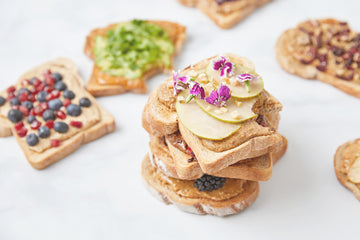
Known botanically as Anacardium occidentale, the cashew nut is actually the seed of the tropical cashew apple (have you noticed the botanical illustration on our Cranberry Cashew Bar wrapper?). The cashew plant is an evergreen shrub closely related to mango, pistachio, and poison ivy that originated in Brazil and made its way to India and East Africa in the 16th century via Portuguese sailors.
These days, cashews are grown in a variety of warm, humid climates such as Vietnam, Nigeria, India, Brazil, and Indonesia. Cashews must be harvested by hand, one at a time, making them very expensive to bring to market. While the seeds of most fruits grow within sweet flesh so that animals will eat the fruits and do their part in propagation, the cashew seed hangs from the bottom (outside) of a cashew “apple,” essentially a swollen stem.
Fresh cashew apples are said to be delicious, but only growers and people living near cashew orchards can enjoy the highly perishable fruit. Cashew apples begin to ferment immediately after they’re picked and typically last less than 24 hours! Thus far, no one has figured out how to harvest and ship fresh cashew apples to the global market, although the fruits can be found canned, in jams, or as the base of a liqueur.
A hard shell with two layers encases the kidney-shaped cashew seed, but beware; a phenolic resin between these layers can blister human skin upon contact (remember that poison ivy connection). The shelling process removes this substance. Because of the potential toxicity, cashews are never sold raw or in the shell.
You might see cashews labeled “raw” in the supermarket, but all cashews undergo some heat in the process to remove the shell and caustic substance. Cashews sold as “roasted” have been cooked twice – once during the shelling process and then roasted to deepen the color and enhance the flavor.
Nutritionally, cashews offer heart-healthy monounsaturated fatty acids; copper, which helps our cells produce energy; and magnesium, a mineral that is crucial for nerve health, muscle cell function, and bone health. Thanks to these properties, as well as their concentration of protein, fiber, and antioxidants, cashews are often considered one of the world’s superfoods.
Our organic cashews come from a single grower in Vietnam. They are fair labor (SMETA) certified, guaranteeing the ethical treatment of those involved in producing them. Look for these delicious cashews in our Cashew Butter with Coconut Nectar, Lemon Cookie Cashew Butter, and Cranberry Cashew Bars!

